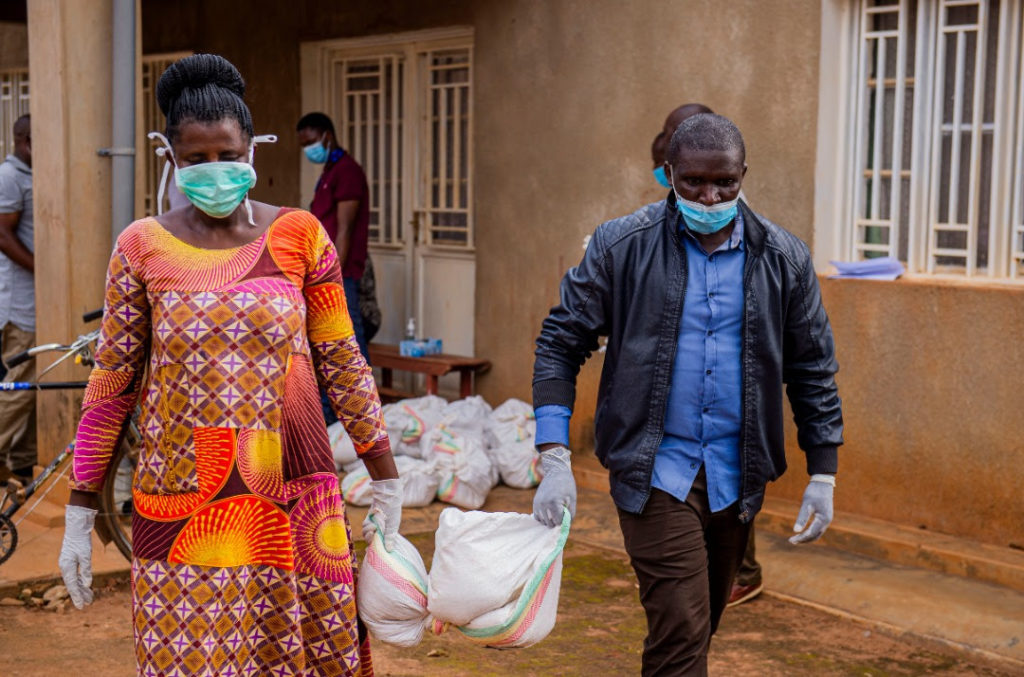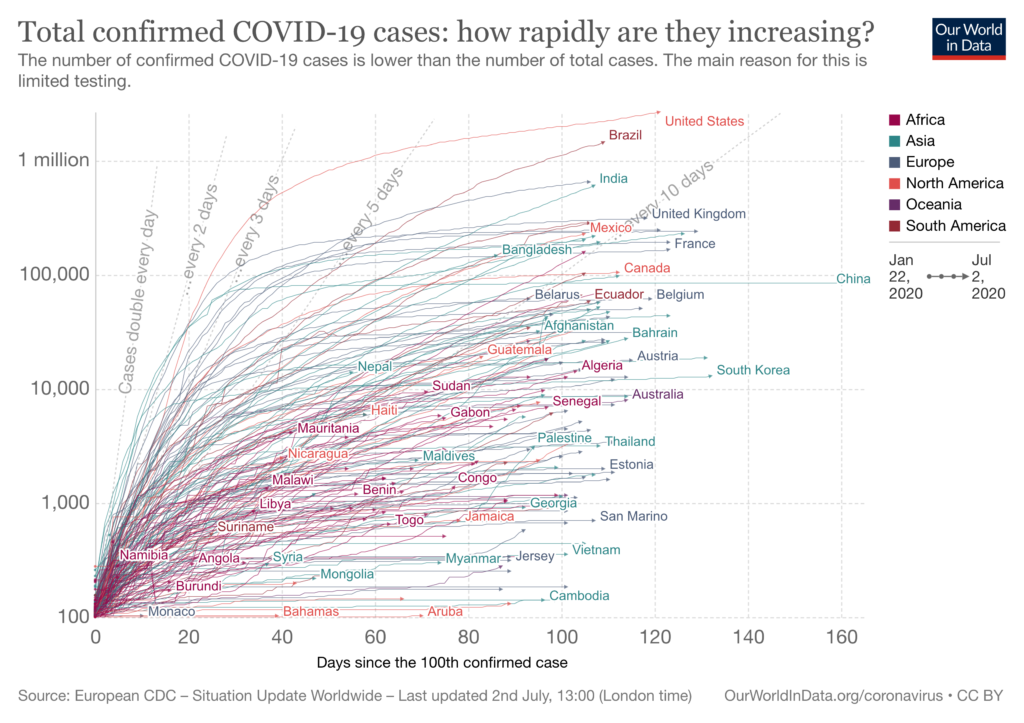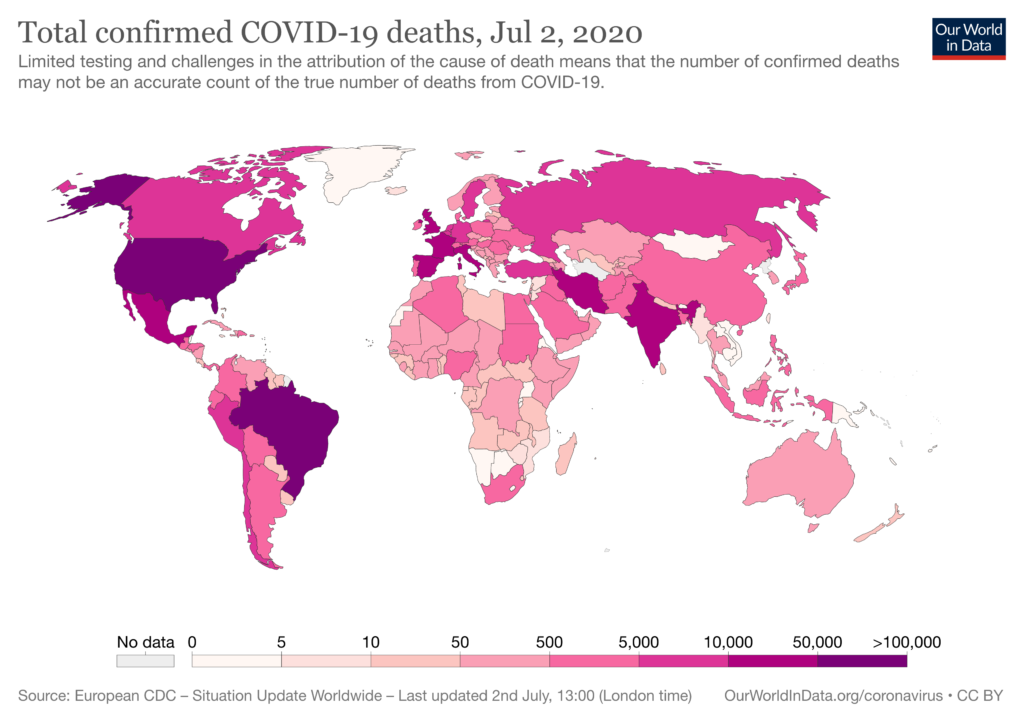Published: 07/03/2020
Dear Global Health Colleagues,
With over 10 million cases worldwide and 500,000 deaths, the COVID-19 pandemic is affecting every aspect of every community. While the world has been shattered by this new disease, reports are coming out about the impact it is having on health systems and their ability to prevent and care for patients of other diseases including HIV, malaria, TB, and cancer. We have included a few articles below that shed light on this cascading impact, and a reflection from an esteemed malaria expert in Rwanda which has managed to control their epidemic so as to permit its population to travel to the EU. Lots to learn from our global partners.
We remain very concerned about the US’s threat to withdraw funding from the World Health Organization (WHO). A webinar last week was hosted by the Consortium of Universities for Global Health where we discussed the severe risks and consequences of this major decision. Steve Morrison and Larry Gostin did a deep dive into the US response going forward and I tried to lay the foundation as to how WHO is structured as a technical enabler and not an enforcer. If you missed the webinar, you can catch it here.
We also continue to be disheartened by the fact that many women scientists are left out of the public realm, which is further amplifying existing gender disparities in science and academia. For some more detail on the statistics, read this piece in The Lancet here.
However, this past week we have some good news in global health worth celebrating: Nigeria was declared polio-free by the WHO and the Democratic Republic of Congo eliminated Ebola. These achievements remind us that with robust scientific research to develop effective interventions, relentless efforts, strong leadership and global cooperation, we can eliminate disease.
In solidarity,
Michele Barry
Drs. Ben and A. Jess Shenson Professor of Medicine and Tropical Diseases
Director of the Center for Innovation in Global Health
Senior Associate Dean for Global Health, Stanford University
Continue to monitor the following reliable websites for the global situation:
Coronavirus COVID-19 Global Cases by the Center for Systems Science and Engineering at Johns Hopkins University – for a dashboard
NIH/NLM | LitCovid—–LitCovid is a curated literature hub for tracking up-to-date scientific information about the 2019 novel Coronavirus. It is the most comprehensive resource on the subject, providing a central access to relevant articles in PubMed. The articles are updated daily and are further categorized by different research topics and geographic locations for improved access.
Resources
Global Trends and Topics
Global Health in the Age of COVID-19: Responsive Health Systems Through a Right to Health Fund (5/4/20): This piece, co-authored by Dr. Michele Barry, advocates that we build back better and establish a Right to Health Capacity Fund to support health systems and ensure Universal Health Coverage to all marginalized groups.
Perspective: Thinking Globally, Acting Locally — The U.S. Response to Covid-19 (5/28/20) This is a paper coauthored by Michelle Mello of Stanford Law which outlines how we need to think globally but consider the US response to the epidemic and demonstrates how federalism has led to states not coordinating their response.
Global Fund COVID-19 report: deaths from HIV, TB and malaria could almost double in 12 months unless urgent action is taken (6/24/20): This article highlights that COVID-19 has cut progress significantly in the areas of HIV, TB and malaria prevention, particularly in LMICs.
Emergence of undetectable malaria parasites: A threat under the radar amid the COVID-19 pandemic? (6/16/20) This article from ASTMH highlights the importance of parasite surveillance during the COVID-19 pandemic.
Management of cervical cancer patients during the COVID-19 pandemic: a challenge for developing countries (6/17/20): This article describes the impact of the COVID-19 pandemic on the management, treatment and prevention of cervical cancer in developing countries.
Regional News
Yemen 5 years on: Children, Conflict and COVID-19 (6/20): This report by UNICEF details the impact of ongoing conflict and COVID-19 on children living in Yemen.
Rohingya refugees at high risk of COVID-19 in Bangladesh (6/25/20) This comment in The Lancet Global Health describes the challenges of responding to COVID-19 in Rohingya refugee camps in Bangladesh.
Converging pandemics: implications of COVID-19 for the viral hepatitis response in sub-Saharan Africa (7/1/20): This comment in The Lancet Gastroenterology & Hepatology provides an account of the effects of COVID-19 on the viral hepatitis response in sub-Saharan African countries.
Domestic Underserved Populations and Health Disparities
Effects of the COVID-19 pandemic on the mental health of prisoners (7/1/20) This comment in The Lancet Psychiatry details the detrimental effect COVID-19 has on the mental health of prisoners worldwide.
Worst virus fears are realized in poor or war-torn countries (6/29/20): This article showcases the disadvantage of LMIC and conflict-torn countries when responding to the COVID-19 pandemic.
Notes from the Field

Dr. Corine Karema
Malaria Senior Program Officer,
African Leaders Malaria Alliance
COVID-19 has put a spotlight on Africa and demonstrates that our countries can respond to the pandemic by deploying innovative local solutions. Rwanda is leading the way, by putting in place several measures to strengthen COVID-19 preparedness through the established multidisciplinary task force: applying an extensive screening system to isolate infected individuals; tracking all contacts using health providers, volunteers and Community Health Workers deployed in each village; decentralizing testing capacity to all regions, while instituting other preventive measures. Rwanda was the first country in sub-Saharan Africa to order a total shutdown. Although handshakes and hugs are part of our culture, most people comply as we understand the seriousness of the virus. In addition, with the support of the Govt of Rwanda, a few private companies and some individuals, free door-to-door delivery of food and essential supplies is given to the most vulnerable households.
However, as a malariologist, I am very concerned about resurgence in malaria, which I have spent my entire career trying to end. Malaria must remain a priority while Africa is coping with the COVID-19 pandemic. A Global Fund report showed that 73% of malaria programs have already reported disruptions in the delivery of prevention and treatment services. In a recent analysis[1] by the WHO, it is estimated that if malaria prevention and treatment are not maintained, malaria deaths in sub-Saharan Africa this year will double from 2018 to 769, 000 people. This increase would be devastating. Rwanda, and a few other countries including Benin, Chad, DRC and Niger have demonstrated that it is possible to maintain critical malaria services such as bed net distributions while putting in place an effective COVID-19 response.
Although the trajectory of the pandemic in Africa is not yet as exponential as initially anticipated, its profound impact on local economies and routine health services is already visible. Africa has local experts with extensive experience and COVID-19 has shone the light on the benefits of leveraging and empowering local leadership and expertise to deploy innovative/ appropriate solutions to fight diseases such as malaria! I am confident that focused leadership, coordinated action, and efficiency in the application of local and external resources will contribute to greater impact.

Upcoming Events and Lectures
July 10-11, 2020
International AIDS Society Conference on COVID-19
The COVID-19 pandemic represents an unprecedented global emergency that has now infected more than 3 million people worldwide and is already the most lethal new pandemic since the emergence of AIDS nearly 40 years ago. In recognition of the urgent need to analyse research, review policy and exchange frontline experiences related to the COVID-19 pandemic, the IAS will host a virtual COVID-19 Conference on 10 – 11* July 2020, shining a spotlight on the latest science, policy and practice of the pandemic. The virtual COVID-19 Conference will take place online on the last day of AIDS 2020: Virtual. It will feature a free-of-charge, stand-alone programme of plenary, invited-speaker and abstract-driven sessions exclusively dedicated to the COVID-19 pandemic.
By Stanford Graduate School of Business
Stanford Rebuild
Stanford Rebuild seeks to encourage and support the world’s innovators and problem solvers to tackle the challenges and opportunities we will face in the coming months. The program organizers believe participants have the potential to significantly accelerate recovery and contribute to a better and more equitable outcome. Participants can spend as much or as little time as they want on the program. The goal is to inspire collective thought and generate solutions. Anyone over 13 years old, anywhere in the world is eligible to apply for Stanford Rebuild. Stanford affiliation and prior entrepreneurial experience are not required. All aspects of Stanford Rebuild are available at no charge.
CIGH is a co-sponsor of this program. Click here to view a complete list of collaborators.
New Funding Opportunities Specific to COVID-19
Online List of COVID-19 Research Opportunities
Stanford’s Research Management Group has created a website that provides a complete listing of funding opportunities for COVID-19 research. The site also provides sponsor and University guidance on grants, clinical trials, and award management impacted by COVID-19.
COVID-19 Research at Stanford
Stanford Medicine scientists have launched dozens of research projects as part of the global response to COVID-19. Some aim to prevent, diagnose and treat the disease; others aim to understand how it spreads and how people’s immune systems respond to it.

